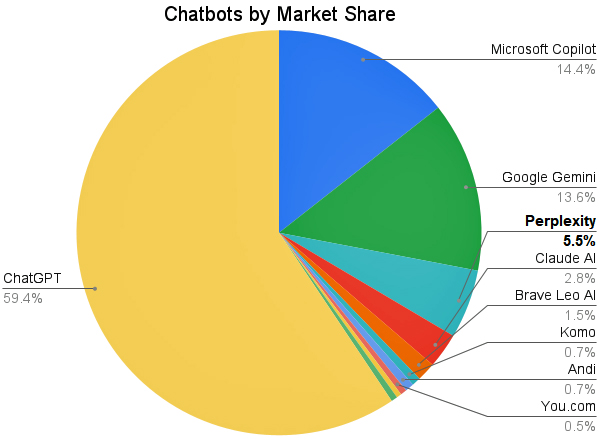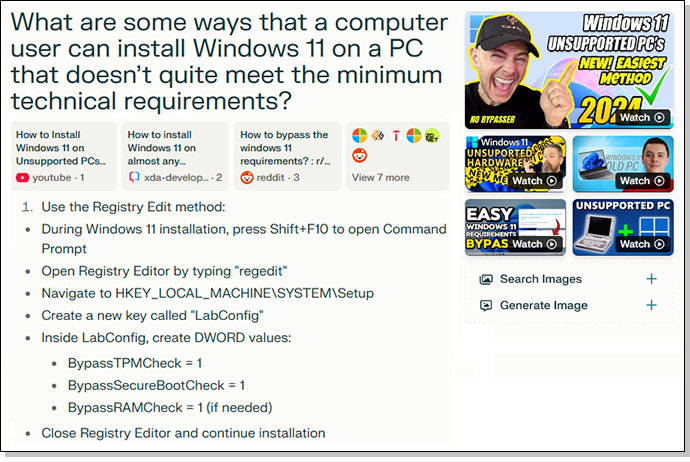|
In this issue PUBLIC DEFENDER: Perplexity is 10 times better than Google Additional articles in the PLUS issue WINDOWS 11: How to add all types of accounts in Windows 11 MICROSOFT 365: Microsoft 365 gets “Copilot Lite” ON SECURITY: You clicked on that phish?
PUBLIC DEFENDER Perplexity is 10 times better than Google
By Brian Livingston • Comment about this article The chatbot wars are well underway, and one result is that I find myself using the new Perplexity search engine 99% of the time, falling back on Google only to look up a street address or some trivial factoid. Google has served up its now-familiar list of 10 links for years. Perplexity also points you to several websites and videos. But its result pages begin with a well-written summary of what you’d learn if you actually visited all those links and vids. It takes me less than a minute to read Perplexity’s superb, human-quality summary of whatever information I asked about. By contrast, evaluating Google’s links — after I’ve located them amidst the search giant’s omnipresent ads — can take me 10 minutes. That’s the basis of the “10 times” superlative in my headline. I’ll be the first to admit that that isn’t really scientific, but it’s close.
Of course, you can pose questions these days to any number of chatbots. Some are listed in Figure 1. But I believe Perplexity is well designed enough to overtake Google’s Gemini chatbot — which is currently in “preview mode” — and even suck market share away from OpenAI’s ChatGPT and Microsoft’s Copilot (both of which use the same GPT large language model, or LLM). Just to state the obvious, many people assume that “nothing will ever replace Google.” But this simply ain’t so. Yes, Google has enjoyed an über-dominant role in search for the past 20 years. But search-engine leadership has actually changed several times since the Dawn of Tech:
I believe it’s now Google’s turn to be disrupted by the onrushing power of new technology. Perplexity itself hammers home the difference between a mere listing of links and its concise roundup of information. The bot firmly announces that it’s an answer engine rather than a search engine. For large enterprises, the firm’s marketers call it a response engine. We’ll see. Leading off with a summary makes all the difference in the world
It’s far beyond the scope of this column for me to test and rate scores of queries on all the chatbots shown in Figure 1, much less the numerous smaller challengers that spring up every day. I’ll leave that to tech bloggers who seem to have unlimited time — and sponsors. But one thing is for certain: I’m impressed every time I enter a question that I assume Perplexity knows nothing about. Invariably, I receive a coherent overview of the topic, which would have taken me up to an hour when using ordinary search tools and exploring where the links lead. The prose at times may be a little dry — kind of like Wikipedia, if it had just awakened from a nap — but you often want “Just the facts, ma’am,” as Sgt. Joe Friday said in the movie “Dragnet.” For example, I asked Perplexity how to install Windows 11 on a PC that doesn’t meet Microsoft’s stringent requirements. I thought the bot would dispense generalities about not offending the Redmond gods. But instead, the answer engine actually described five different ways in detail. The first method is shown in Figure 2. The other routes included using such tools as Rufus and WinBootMate, and even the official MoSetup workaround that Microsoft tucked into the Registry.
Perplexity’s search-results page also enabled me to generate three images of the Win11 installation process, using DALL-E 3. Such chatbot-generated images would be helpful if, say, I wanted to post something to social media about the alternative installation methods. If you’d like to see the complete answer for yourself, use the “search result” hyperlink in Figure 2’s caption. Perplexity encourages users to share its result links as a form of viral marketing. The empire strikes back: ChatGPT has just launched its own search engine
As if on cue, the 900-pound gorilla that is OpenAI announced its own search engine as recently as October 31, 2024. The new service, known imaginatively as ChatGPT Search, is initially available only to paid ChatGPT Plus and Team subscribers, in addition to some OpenAI waitlist users. “We’ll roll out to all Free users over the coming months,” the announcement says. I coughed up 20 bucks to get a month of ChatGPT Plus. The signup funnel is hard to find. Start from the ChatGPT instruction page, register and/or upgrade to paid, then sign in and click the tiny “globe” icon in the input box. When I presented ChatGPT Search with the query in Figure 2, OpenAI’s technology also suggested five ways I could do the job. But the instructions weren’t as detailed as Perplexity’s. Worse, the service displayed only a small icon at the bottom of the page, bearing a few links to other sites — where I could double-check the directions before I actually subjected a working machine to them — and no links at all to instructional videos. Huh, some search engine! When I posed the same question to Google, it gave me links to two Microsoft pages, seven other websites, and three videos. But instead of leading with a summary of the correct answer, Google’s results page started off with an alarming message: “Can’t generate an AI overview right now. Try again later.” What, Google’s bot needed a cigarette break? In reality, Google has been showing its AI overviews a lot less often due to a “disastrously embarrassing launch,” as the Futurism blog reports. An overview was displayed in 84% of search results earlier this year, but in fewer than 15% today, according to a study by search-engine optimization firm BrightEdge. Until Google somehow fixes its overviews, you may never see one. I could also have asked Gemini, Google’s “preview” chatbot. But that bot requires that you either register with Google, buy Google Workspace (where Gemini is “free for 14 days”), or download a mobile app. By comparison, Perplexity is open to anyone who visits its website. There are many attractive features of Perplexity. Let me enumerate a few of them here:
Perplexity provides accuracy, while its competitor’s benefit is just creativity? Ouch! Tell us how you really feel, Perp! Search isn’t a service, it’s a business
I’ve already mentioned some of the costs of using these chatbot tools. The prices of each entity are malleable and seem to change by whim. At the risk of being a day late and a dollar short, here’s my overview of what you might pay for the “big three” chatbots:
Perplexity is no backyard-garage startup — it’s already worth $8 billion
In case you fear that Perplexity is a flash in the pan that could fold tomorrow, take heart, pioneers. The firm has a solid financial footing and is something of a darling among observers of “unicorns” (firms worth over $1 billion that haven’t yet gone public). The company’s origin story is almost as interesting as the technology itself. Give a listen.
Aravind Srinivas is the CEO of Perplexity. (Photo at left from the Discovery Daily Podcast on a Perplexity webpage.) As a young man, Srinivas graduated with a bachelor’s degree in electrical engineering from the Indian Institute of Technology in Madras, India. After moving to the United States, he landed a job as an intern at OpenAI in 2018. This was followed by internships at Google’s DeepMind lab in London and at Google’s HQ in Mountain View. Frustrated with his “mere” engineering degree, Srinivas completed a Ph.D. in computer science from the University of California, Berkeley, in 2021. He went back to OpenAI, this time as a research scientist on LLMs. But he walked away from the “open” firm in August 2022 to co-found Perplexity with other AI experts from Facebook, Quora, and Tower Research Capital. Based in San Francisco, Perplexity launched for public use in December 2023. Back then, it served only about 2,500 queries per day. By January 2024, the company was valued at just $520 million. Today, the answer engine serves more than 15 million queries per day and generates revenue of $50 million annually. The company is in talks with investors for its third funding round this year — a sizzling rate of capital infusions, according to a Wall Street Journal article. That would value the firm at $8 billion. The company hasn’t filed an IPO (initial public offering) to sell shares, but when that occurs, Srinivas will own an undisclosed percentage of them. Nice work, if you can get it! Of course, all that money pales in the face of OpenAI’s $157 billion valuation. (The company occupies the financial stratosphere with AT&T, Goldman Sachs, Uber, and the like.) But any competitor that ignores Perplexity will regret it. The answer engine’s share of queries more than doubled from 2.7% in January 2024 to 5.5% in September 2024. Meanwhile, ChatGPT’s share fell from 76.4% to 73.8%, and Gemini’s dropped from 16.2% to 13.6%, according to a First Page Sage analysis. Perplexity is definitely a growth story to watch. Google was once a startup, too, and look what a giant it turned into. The choice is yours, and I won’t say it’s an easy one
Unfortunately, as much as I like using Perplexity — and marveling at the detail of its explanations, as though it recently completed a book on the subject — it may or may not be for you. You can’t try every chatbot, so I suggest you experiment with the free version of Perplexity and see whether its novel approach to “organizing the world’s information” appeals to you. Don’t forget to slide the Pro button to the ON position, in order to get the deeper analysis that the answer engine is capable of. Warning: There’s a delay of a few seconds before the more-sophisticated Pro version of the summary shows up. But I just take a sip of coffee and enjoy the satisfaction of seeing the answer almost before I asked the question. If that intro doesn’t work out for you, well, Yahoo still has a search engine — and, as the company’s founders said when they first set up their website, You Always Have Other Options.
The PUBLIC DEFENDER column is Brian Livingston’s campaign to give you consumer protection from tech. If it’s irritating you, and it has an “on” switch, he’ll take the case! Brian is a successful dot-com entrepreneur, author or co-author of 11 Windows Secrets books, and author of the fintech book Muscular Portfolios.
The AskWoody Newsletters are published by AskWoody Tech LLC, Fresno, CA USA.
Your subscription:
Microsoft and Windows are registered trademarks of Microsoft Corporation. AskWoody, AskWoody.com, Windows Secrets Newsletter, WindowsSecrets.com, WinFind, Windows Gizmos, Security Baseline, Perimeter Scan, Wacky Web Week, the Windows Secrets Logo Design (W, S or road, and Star), and the slogan Everything Microsoft Forgot to Mention all are trademarks and service marks of AskWoody Tech LLC. All other marks are the trademarks or service marks of their respective owners. Copyright ©2024 AskWoody Tech LLC. All rights reserved. |
|||||||||||||||||||||||||||



















